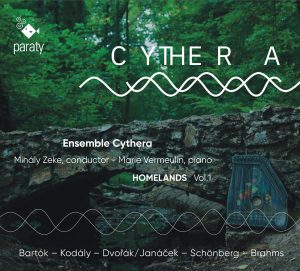CD Review: Homelands Vol. 1 – Ensemble Cythera
CD Review by T. J. Harper, D. M. A.
Head picture: Ensemble Cythera, cond. Mihály Zeke © Sébastien Brohier
Homelands Vol. 1 – Ensemble Cythera
Volume I – Hungary to Germany
Mihály Zeke, conductor
Marie Vermeulin, piano
Recorded at Abbey of Marienmünster, Nordrhein-Westfalen, Germany
(2020, 60’ 34”)
www.ensemblecythera.com
The 18th Century French Rococo painter Jean-Antoine Watteau’s work, Pilgrimage to Cythera, ushered in a new type of painting known as la fête galante, an allegorical representation of courtship and falling in love. This style focused on the revival of color and movement within painting which were featured most prominently in the bucolic and idyllic scenes of pseudo-amorous entertainments of the time. In the title for this painting, the Greek island of Cythera was a most appropriately selected destination as it was the birthplace of the deity Aphrodite, Goddess of Love. Similarly, conductor Mihály Zeke has selected this same island as an ideal moniker for the newly-formed, pan-European chamber choir that strives for the “highest standard of technical quality and passionate expressiveness” in their contemporary revival of choral colors as a representation of their own love of choral music. The love of choral music and passionate expressiveness expressed by Ensemble Cythera is closely aligned to the Greek concept of pragma or enduring love which is characterized by its deep commitment and dedication.
The cultural landscape of a people is rooted deep in the past, often reaching beyond recorded history. Over time, through the oral tradition, these origins are preserved within a culture through speech or song and passed from one generation to the next, helping to inform, define and enrich a people’s history. In Homelands Vol. I, Cythera demonstrates their pragma or deep commitment and dedication to the carefully curated repertoire to realize the critical significance our folk history provides to better appreciate this heritage and contextualize it for continued artistic growth. Musicologist and fellow at the French National Center for Scientific Research Hervé Audéon astutely suggests that “…to give a sophisticated dimension to a folk culture acts to strengthen it and enables its transmission by inscribing it in a tradition that surpasses the limitations of its natural boundaries.” Once surpassed, the musical tradition informed by “sophisticated dimension” becomes more than a means of preserving the past. It affirms our collective identity and allows us to communicate with clarity and purpose to understand the value of our shared, collaborative future.
Homelands Vol. 1 is an exceptional and ambitious debut recording for Cythera under the adept artistic direction of Mihály Zeke. This recording features works by Zoltán Kodály (1882–1967), Béla Bartók (1881–1945), Antonín Dvořák (1841–1904) arranged by Leoš Janáček (1854–1928), Arnold Schönberg (1874–1951), and Johannes Brahms (1833–1897). The true strength of this recording lies in the selection of integral but rarely performed compositions combined with more traditional pillars of this broad genre that create an eclectic but thematically homogeneous artistic statement. This album is indeed a constant dialogue between tradition and modernity, between orally-transmitted music and written choral music. Upon close inspection, the listener is invited to appreciate the thoughtful ordering of the repertoire into three distinct but related categories by artistic director, Mihály Zeke: External, Internal Objective, and Internal Subjective.
- In the first category, the External is represented in Mátrai képek (Mátra Pictures) by Zoltán Kodály. This work is a sweeping glance at the vastness of country life but from the perspective of a tourist, looking in from the outside at the various and varied comings and goings of folk life and the people within.
- In the second category, the Internal Objective works as an eclectic series of intimate portraits of country life, individuals, matters of the heart, and loss. The works represented here are from two collections of folk songs by Béla Bartók: Magyar népdalok (Hungarian Folk Songs), and Négy tót népdal (Four Slovak Folk Songs). This is followed by one set of songs by Antonín Dvořák arranged by Leoš Janáček: Šest moravských dvojzpěvů (Six Moravian Duos).
- Finally, the third category, Internal Subjective, takes a close look at the intimate expansiveness of Folk life through the eyes of the community member. Here, matters of the heart, faith, the soul connect with a quiet reflection on the virtuous nature of belonging and what it means “to be home” (An die Heimat). The works representing this third category are Drei Volkslieder (Three German Folk Songs) by Arnold Schönberg, and Volkslieder (Folk Songs) by Johannes Brahms.
A compelling aspect of this recording is the ability of Ensemble Cythera to realize each performance without artificially superimposing themselves upon the composition. Rather, deference is given to the character and spirit of each work and the compositions are allowed to speak for themselves, to honestly convey the composers’ intentions. The emotional sincerity in each performance draws the listener into the pastoral and often-times intimate nature of each story instead of keeping the listener at a distance. Artistic Director, Mihály Zeke confidently conveys clarity of text and emotional content without sacrificing balance of performing forces or narrative arc from the most straightforward settings to the most complex. There is a consistent aural palate achieved throughout the recording, which speaks to an incredibly high level of understanding, sensitivity, and technical facility from the singers.
Special mention must be given to pianist Marie Vermeulin who is featured playing an 1896 Steinway in the Bartók Négy tót népdal (Four Slovak Folk Songs), the Šest moravských dvojzpěvů (Six Moravian Duos), and An die Heimat (To the Homeland) by Brahms. Vermeulin, with advanced studies at the Conservatoire National Supérieur Musique et Danse de Lyon (CNSMD de Lyon) achieves remarkable color, phrasing, energy, and sensitivity in each recording. The power of her accompaniment is only matched by her technical finesse in perfect collaboration with the singers.

Cythera is a European chamber choir founded by Mihály Zeke in 2019 following his years at the head of Arsys Bourgogne. Cythera was born out of the desire to form a new group of international composition and open to new forms of artistic collaboration. The ensemble’s size varies around an average of 24 singers according to each different project. The choir is dedicated to bringing the best choral music, old and new, to audiences while striving for the highest standard of technical quality and for passionate expressiveness. Cythera’s singers, chosen for their unique artistic personality, are marked by high individual skill as soloists in a wide range of repertoire as well as by their capacity to blend into a homogeneous sound.
Mihály Zeke founded Cythera in 2019. He collaborates regularly with orchestras such as La Fenice, Pulcinella and the Orchestre Dijon Bourgogne as well as with Accentus and the Hungarian and Hellenic Radio Choirs. He currently teaches in Tübingen and in Stuttgart, where he also conducts the University Symphony Orchestra and Choir. A passionate musician committed to engaging audiences with thrilling performances, he continues to gain a reputation as a musical force equally versed in symphonic repertoire, opera, and new music.
Homelands Vol. 1 was recorded from February 28 to March 1, 2020 at the Abbey of Marienmünster, Nordrhein-Westfalen under the artistic direction of Mihály Zeke and with sound engineer Piotr Furmanczyk. Homelands is planned as a pentalogy of recordings offering a panorama of choral repertoire based on folk melodies from all over Europe, as reimagined by some of the 19th and 20th centuries’ greatest composers.
You discovered an exciting book about choral music? a CD? a fascinating playlist or an amazing choir video? tell us about it! (icb.editor@ifcm.net)
 J. Harper is Associate Professor of Music, Director of Choral Activities and Chair of the Department of Music at Loyola Marymount University in Los Angeles, CA. He conducts the University’s three choral ensembles as well as courses in Conducting, Secondary Choral Methods, Applied Conducting, and Applied Voice. Dr. Harper received the Doctor of Musical Arts degree from the University of Southern California where he graduated with honors. www.harpertj.com
J. Harper is Associate Professor of Music, Director of Choral Activities and Chair of the Department of Music at Loyola Marymount University in Los Angeles, CA. He conducts the University’s three choral ensembles as well as courses in Conducting, Secondary Choral Methods, Applied Conducting, and Applied Voice. Dr. Harper received the Doctor of Musical Arts degree from the University of Southern California where he graduated with honors. www.harpertj.com
Edited by Taylor Ffitch, USA
